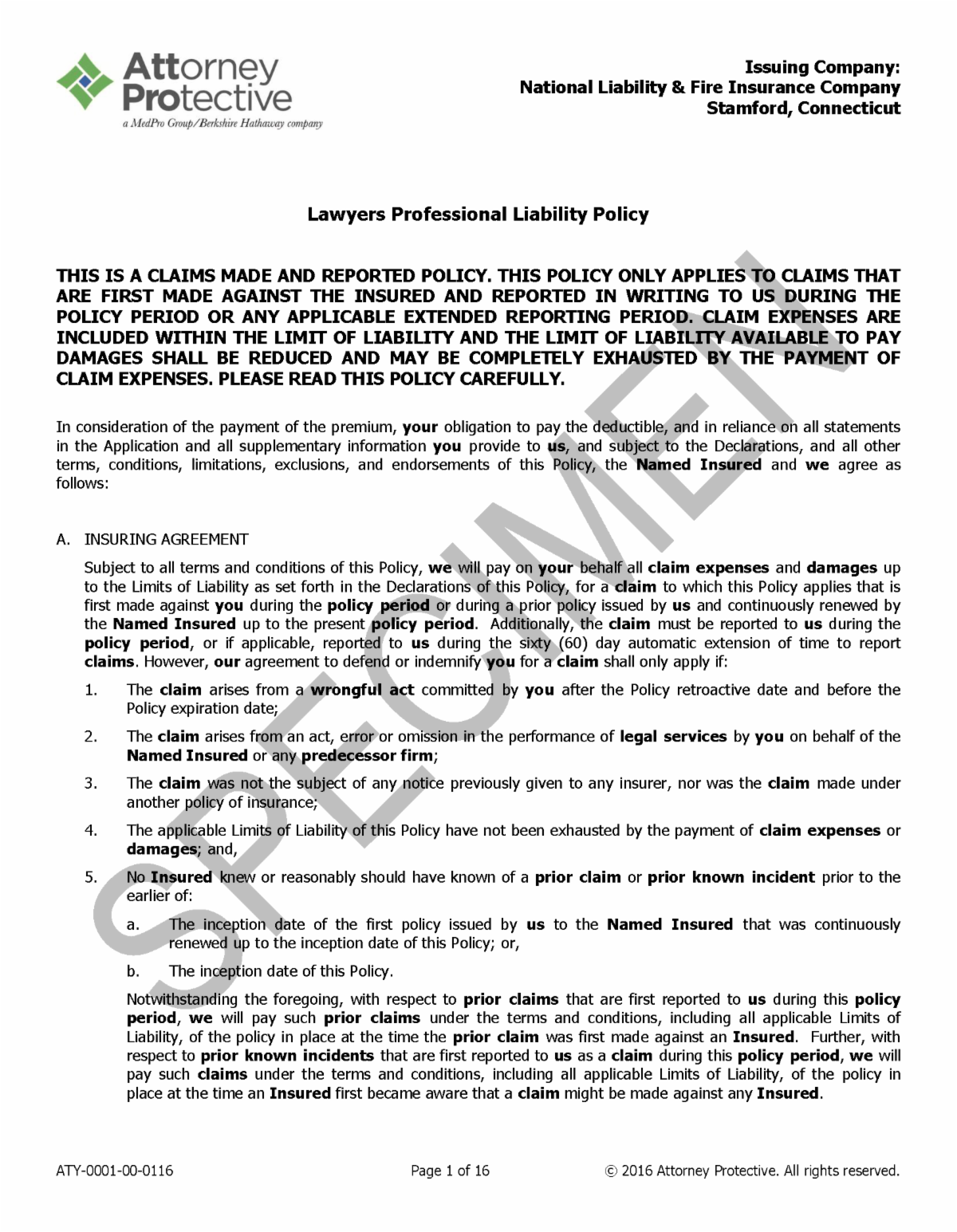
Attorney Malpractice Insurance Policies are claims-made and reported policies. When the coverage ends the ability to report claims for past acts ends at policy termination. Attorneys leaving private practice via retirement, becoming a judge or working in the private or public sector need to protect their past acts. Insurers will not renew attorney malpractice policies for attorneys that are no longer in private practice. Given this it is important for attorneys to protect their past acts once coverage ends. For solo practitioners and small firms that may close once the practitioner leaves, the nonpracticing Extended Reporting Period Endorsement/Retirement Tail (ERP) may be an answer.
Note: For attorneys closing or leaving their small firm to work at another law firm the nonpracticing Extended Reporting Period Endorsement/Retirement Tail (ERP) is not an option. Coverage for their past acts is outside of the scope of this blog.
Each insurer’s policy differs on requirements and wording for obtaining this valuable ERP endorsement at no or reduced cost. Careful planning by the attorney may save the attorney thousands of dollars. The ability to request an ERP differs by insurer but is time sensitive. Regardless of the insurer, the attorney must completely stop private practice to obtain the nonpracticing ERP.
The Attorney Protective policy provides a nonpracticing ERP based on the following policy language:
H. EXTENDED REPORTING PERIODS
1. Terms and Conditions Applicable to All Extended Reporting Periods
a. If this Policy is canceled or non-renewed by the Named Insured or us for any reason, or if an Insured is otherwise eligible for an extended reporting period option as set forth in sections H.2. or H.3. below, we shall, upon written request of the Named Insured, make an offer of an extended reporting period for the terminated coverage, subject to the following terms and conditions:
(1) The Named Insured must make the request to us in writing, and pay the additional premium, if any, within sixty (60) days of cancellation or non-renewal of this Policy, or in the alternative, within the time periods set forth for the extended reporting period options under H.2. or H.3. below; and,
(2) Any extended reporting period, and all claims reported thereunder, shall be subject to all terms and conditions of this Policy.
b. Any extended reporting period:
(1) Must be evidenced by an endorsement issued by us in writing;
(2) Will provide the Named Insured with an additional period of time as set forth in the endorsement to report claims first made or brought against an Insured during the policy period or during the extended reporting period;
(3) Shall not constitute a new policy;
(4) Shall not reinstate, increase or renew the Limits of Liability, and such limits shall be a part of, and not in addition to, the Limits of Liability for the policy period; and,
(5) Shall cover only those claims based upon or arising from wrongful acts committed by an Insured after the Policy retroactive date and before the end of the policy period.
c. The right to any extended reporting period endorsement is expressly extinguished if:
(1) Any amount payable to us under the Policy has not been paid in accordance with the terms of payment, including the failure to pay any premiums when due, or the failure to timely pay deductible amounts due and owing;
(2) Any Insured made material misrepresentations in the Application, supplements, addendums or attachments to the Application or to underwriting inquiries;
(3) At the time this option could be exercised, the relevant Insured was not licensed to practice law, or had his or her license revoked, suspended or surrendered for any reason; or,
(4) There is or was any material noncompliance by an Insured with any of the terms or conditions of this Policy.
2. Non-Practicing Extended Reporting Period – Additional Terms & Conditions
Upon the total and permanent retirement or cessation of the full-time or part-time practice of law, an Insured may be eligible for an extended reporting period endorsement, subject to the following terms and conditions:
a. The relevant Insured retired or ceased the full-time or part-time practice of law, or leaves the private practice of law to become a state or federal judge, during the policy period;
b. The relevant Insured was, at the time this option could be exercised, a partner, principal, officer, director, shareholder or employed lawyer, other than an independent contractor, who was paid under a regular payroll schedule or firm distribution and had federal and state (if applicable) taxes withheld by Named Insured;
c. The Named Insured was insured by us for at least three (3) consecutive years prior to the request for the Non-Practicing Extended Reporting Period and the relevant Insured was employed by the Named Insured for those same three (3) years;
d. The relevant Insured notifies us in writing of their retirement or cessation of the practice of law and intent to exercise this option within sixty (60) days of date the relevant Insured retires or ceases the practice of law, or at the end of the policy period, whichever comes first; and,
e. Coverage provided under the Non-Practicing Extended Reporting Period will cease immediately upon an Insured’s resumption of full or part time practice of law. However, Insureds performing voluntary or uncompensated legal services on a full or part-time basis for or on behalf of not-for-profit organizations or purposes will be considered retired for the purpose of retaining their Non-Practicing Extended Reporting Period under this subsection so long as such Insureds have otherwise ceased the practice of law, provided no other legal services, and are not compensated in any way (not including reimbursement for actual costs or expenses related to the uncompensated representation) for providing the legal services. Such voluntary legal services are not covered by the Non-Practicing Extended Reporting Period as set forth in Section H. Receipt of free office space or supplies or provision of health care or other benefits in exchange for legal services is considered to be compensation for legal services.
3. Death or Permanent Disability Extended Reporting Period – Additional Terms & Conditions
Upon the death of an Insured or when an Insured becomes totally and permanently disabled, the relevant Insured may be eligible for an extended reporting period endorsement of up to five (5) years for no additional payment of premium under the following terms and conditions:
a. The relevant Insured died or became totally and permanently disabled during the policy period, and the death or disability was not the result of suicide, drug or alcohol abuse, or an intentionally self-inflicted wound;
b. The relevant Insured was, at the time this option could be exercised, a partner, principal, officer, director, shareholder or employed lawyer, other than an independent contractor, who was paid under a regular payroll schedule or firm distribution and had federal and state (if applicable) taxes withheld by Named Insured;
c. The Named Insured was insured by us for at least three (3) consecutive years prior to the request for the extended reporting period;
d. Within sixty (60) days of the death or total and permanent disability, or within thirty (30) days of the end of the policy period, whichever comes first, the relevant Insured or their legal representative notifies us in writing of the death or disability, provides evidence satisfactory to us of such death or disability, and requests this extended reporting period endorsement; and,
e. The extended reporting period endorsement expires upon the expiration of five (5) years, or the date the estate is discharged, or the date the relevant Insured is no longer totally and permanently disabled, whichever comes first.
SECTION 1. DEFINITIONS
16. Named Insured means the person or entity designated as such in the Declarations of this Policy.
31. You, your or Insured means:
a. The Named Insured and any predecessor firm specifically named in the Declarations of this Policy;
b. Any present partner, principal, officer, director, shareholder, or employed lawyer of the Named Insured, but only during the performance of legal services in the course and scope of their duties on behalf of the Named Insured;
c. Any past partner, principal, officer, director, shareholder, or employed lawyer of the Named Insured, but only while they rendered or failed to render legal services in the course and scope of their duties on behalf of the Named Insured;
d. Any lawyer who acts as Of Counsel or as an independent contractor to the Named Insured and is designated as such in the Application and is listed in the Named Insured’s records as Of Counsel or as an independent contractor at the time of the wrongful act, but only during the performance of legal services on behalf of the Named Insured;
e. Any non-lawyer employee or non-lawyer independent contractor of the Named Insured whose work is engaged and directed by the Named Insured, but only with respect to the furtherance of legal services rendered and while acting in the course and scope of their duties on behalf of the Named Insured; or,
f. The estate, heirs, executors, administrators, assigns and legal representatives of any Insured in the event of such Insured’s death, incapacity, insolvency or bankruptcy, but only to the extent such Insured would otherwise be provided coverage under this Policy.
Switching insurers near retirement to save a few dollars may cost an insured attorney thousands of dollars to buy the same protection. Planning retirement or a transition out of private practice should be discussed with your malpractice insurance agent prior to ending private practice when possible.
CLICK HERE TO OBTAIN AN ATTORNEY MALPRACTICE QUOTE

Lee Norcross, MBA, CPCU
(616) 940-1101 Ext. 7080